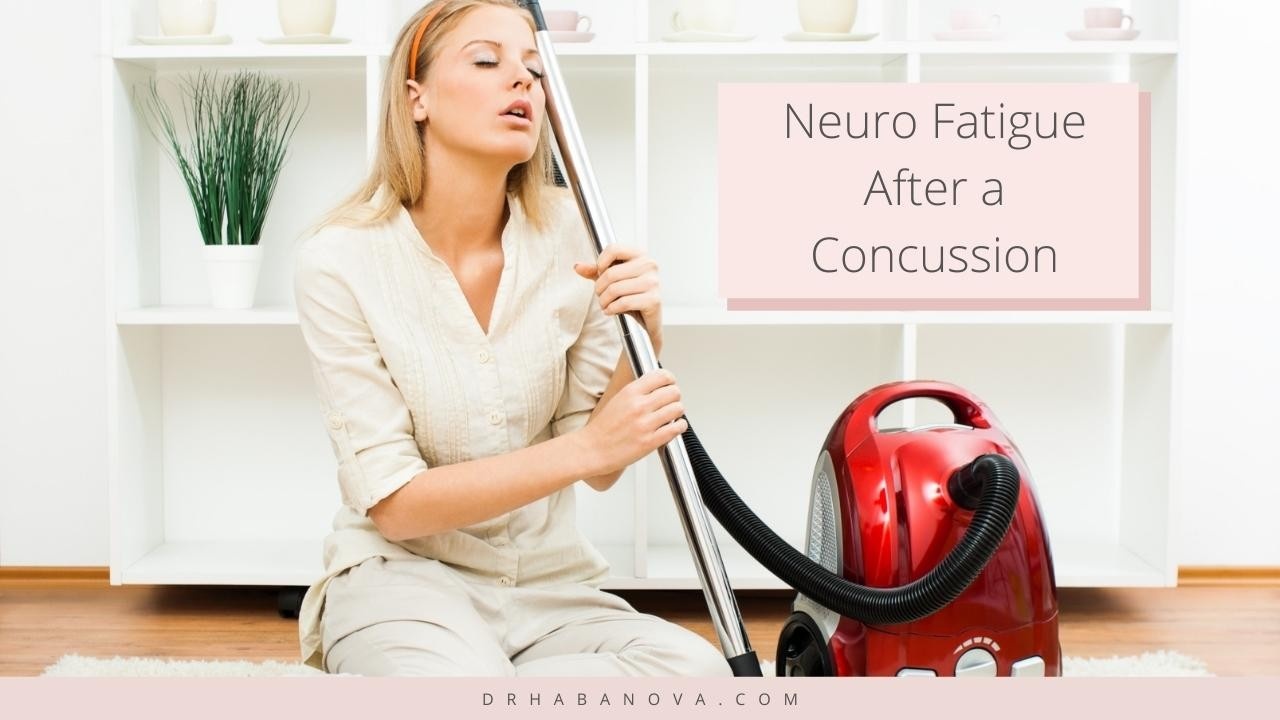
Neuro Fatigue After a Concussion
Jan 01, 2023Fatigue is one of the most frequently reported symptoms after a mild traumatic brain injury also known as a concussion.
What is a Concussion?
A mild traumatic brain injury, also known as a concussion, is caused by a bump, blow, or jolt to the head or by a hit to the body that causes the head and brain to move rapidly back and forth. This sudden movement can cause the brain to bounce around or twist in the skull, creating chemical changes in the brain and sometimes stretching and damaging brain cells. (CDC, HeadsUp).
What is Neuro Fatigue?
You know the kind of tired you get after a brisk walk, or some strenuous physical activity, or even after doing housework? That kind of fatigue is called physically fatigued and with adequate rest, recovery occurs and you are ready to go again.
Well, neuro fatigue is different.
It's a kind of fatigue that occurs when thinking, learning, processing information, watching TV, reading a book, working on the computer, listening attentively, being in a loud environment, or having too much visual input.
Neuro fatigue is a consequence of trauma to the brain. The cell-to-cell connections in the brain get damaged causing a disruption to the brain's ability to communicate as efficiently with itself and all other parts of the body. This leaves the concussed individual having to expend more effort to complete the same tasks as before.
What Does Neuro Fatigue Cause?
These damaged connections can cause a slowing of physical, cognitive, and emotional abilities (Johansson & Ronnback, 2014), and hence why neuro fatigue can negatively impact relationships, work, school, and quality of life. Neuro fatigue alters your motivation, and ability to appropriately inhibit emotional responses, and can lead to decreased participation in social and family activities. Oftentimes, one feels overloaded or overstimulated which can lead to physical and/or emotional shutdown. Unfortunately, no amount of sleep or rest will abate these symptoms.
Neuro Fatigue Does Not Discriminate
After a traumatic brain injury, fatigue affects about 65 percent of individuals (Eisenberg, Meehan, & Mannix, 2016), and can last anywhere from a few weeks to months, or possibly become a lifelong struggle.
Anyone who has sustained a concussion of any severity can struggle with fatigue symptoms after an injury. Research has not shown a distinguishable gender difference as to who is more at risk for neuro fatigue (Duncan, Wu, & Mead, 2012).
Types of Neuro Fatigue
Concussed individuals can experience two types of neuro fatigue: cognitive neuro fatigue or pathological neuro fatigue, or even a combination of both.
Cognitive Neuro Fatigue: The disruption to the brain’s circuitry system causes the brain to work harder at certain tasks and it must expend copious amounts of energy to keep up. Activities such as reading, studying, using a computer, or watching television, quickly cause fatigue. Typically, there is a disproportionally long recovery time needed to restore these energy levels after cognitive exhaustion has set in (Johansson & Ronnback, 2014).
Pathological Neuro Fatigue: This is a feeling of physical fatigue that is felt after little effort is expended doing minimal daily activities. Everyday errands and tasks can be extremely taxing. Routine tasks, such as grocery shopping or attending a class, are exhausting. This type of fatigue is not responsive to sleep or rest.
Long Term Effects
On average, 62 percent of those who have suffered a mild traumatic brain injury (concussion) have reported continued problems with fatigue 10 years after the injury (Zumstein et al., 2011), and individuals who reported significant increases in fatigue over the first 2 years demonstrated poorer outcomes in cognition, motor symptoms, and general functioning than those with decreased or stable fatigue (
Neuro fatigue can be associated with anxiety, depression, pain, sleep disturbance, cognitive impairment, and mood disorders. Any of these pre-existing conditions may exacerbate the effects of neuro fatigue due to a recent concussion. Self-medicating with various substances tends to commonly occur to soothe the stress caused by the various symptoms.
Who Can Help with Neuro Fatigue Symptoms?
Various practitioners specially trained in treating traumatic brain injuries can appropriately evaluate and treat neuro fatigue. Many times a team of healthcare experts may need to work collaboratively together to ensure your greatest outcome. These can include any combination of Chiropractic Neurologist, Neuro-Optholomolgist, Physical Therapist, Occupational Therapist, Acupuncture Physician, Functional Medicine Practitioner, and your Primary Care Physician. These professionals can accurately evaluate and appropriately treat the underlying post-concussive syndrome and help lessen the symptoms of neuro fatigue. By identifying if any confounding neurological or metabolic issues are contributing to your experience of neuro fatigue, they can assist you in getting back to normal daily activities.
Visit the American Chiropractic Neurology Board or the American College of Functional Neurology for a list of qualified practitioners in your area.
Timing is Crucial
It is advised to visit a practitioner highly trained in brain injury and recovery within 24 hours after sustaining a concussion for diagnosis and treatment. Early detection and appropriate concussion management and recovery are essential to optimal outcomes and lessened symptoms. The brain typically takes 3-4 weeks to heal after a concussion and all symptoms should resolve in that time frame. Should any lingering symptoms be experienced after 4 weeks, the post-concussion syndrome has set in and the brain has not healed optimally. Neurorehabilitation is required to resolve the lingering symptoms. Thankfully, the brain has the potential to create new connections and restore its functions given the appropriate stimuli. It's in your best interest to work with a trained concussion specialist who has the knowledge and resources to treat concussions and post-concussion symptoms like neuro fatigue.
References:
1. What is a Concussion? HeadsUp. CDC Injury Center. (2019).
2.
3. Duncan, F., Wu, S., & Mead, G. E. (2012). Frequency and natural history of fatigue after stroke: A systematic review of longitudinal studies. Journal of psychosomatic research, 73(1), 18-27.
4. Eisenberg, M. A., Meehan, W. P., & Mannix, R. (2014). Duration and course of post-concussive symptoms. Pediatrics, peds-2014. doi: 10.1542/peds.2014-0158.
5. Johansson, B., Bjuhr, H., & Rönnbäck, L. (2012). Mindfulness-based stress reduction (MBSR) improves long-term mental fatigue after a stroke or traumatic brain injury. Brain injury, 26(13-14), 1621- 1628.
6. Stulemeijer, M., van der Werf, S., Bleijenberg, G., Biert, J., Brauer, J., & Vos, P. E. (2006). Recovery from mild traumatic brain injury. Journal of Neurology, 253(8), 1041-1047.
7. Zumstein, M. A., Moser, M., Mottini, M., Ott, S. R., Sadowski-Cron, C., Radanov, B. P., ... & Exadaktylos, A. (2011). Long-term outcome in patients with mild traumatic brain injury: A prospective observational study. Journal of Trauma and Acute Care Surgery, 71(1), 120-127.

Unresolved memory loss with worsening brain fog impacting your life on every level




